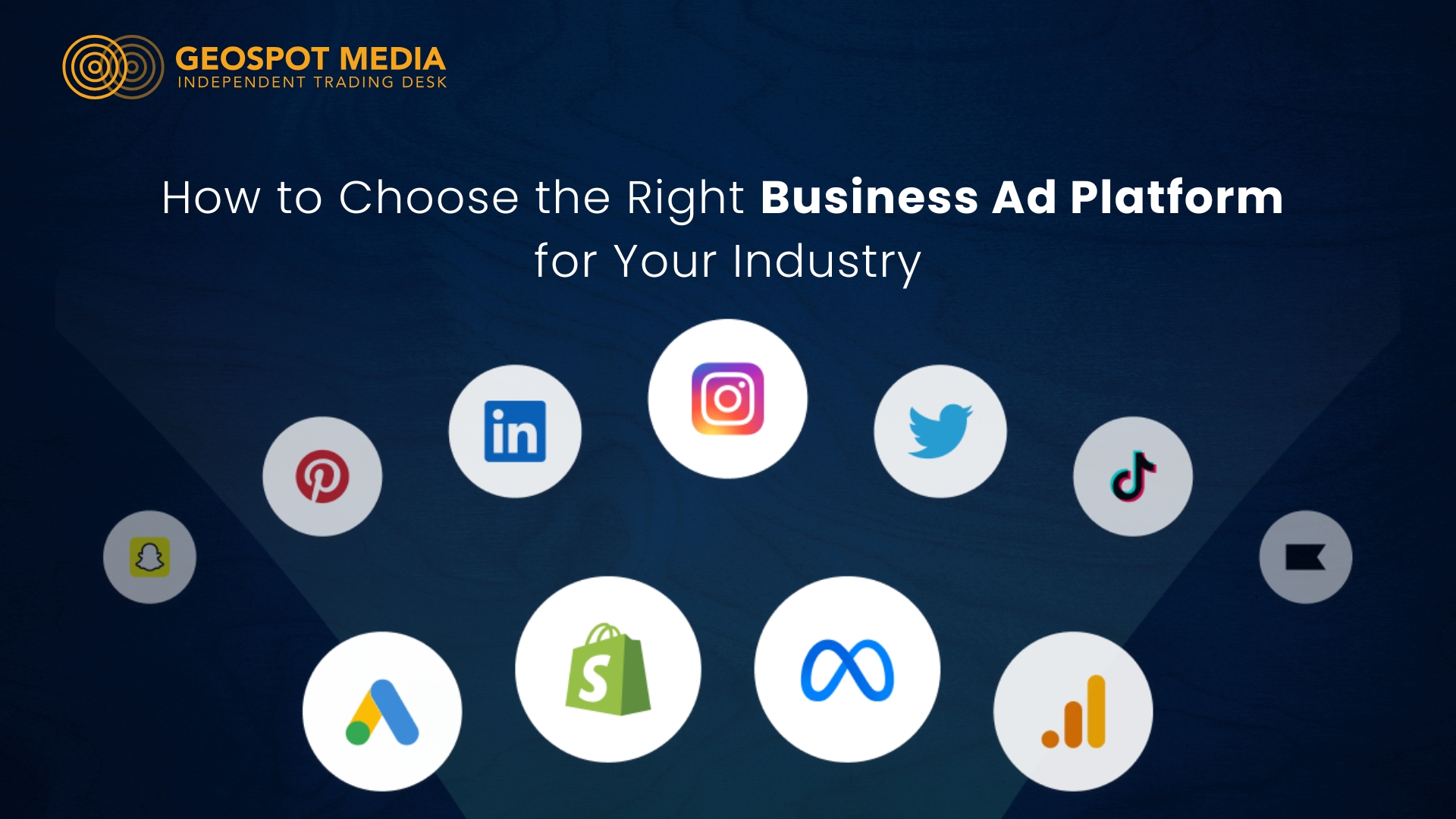How to Choose the Right Business Ad Platform for Your Industry
“In today’s digital world, choosing the right business ad platform is critical to reaching your audience effectively. With so many advertising options, investing your budget wisely can feel overwhelming. As there are a lot of platforms, choosing where to invest your advertising budget is confusing. Each platform possesses exclusive advantages, demographics, forms, and cost models. This is why you need to select the proper business advertising medium applicable to your business so as to reach your desired marketing objectives.
In the blog, we will find out what business ad platforms are, how to analyze them, and how to orient them to your industry and goals.

Understanding What a Business Ad Platform Is
An ad platform of business is an online service or tool that allows companies to make, manage, and display advertisements to targeted audiences. These platforms collect data on user behavior, demographics, and interests, enabling businesses to tailor their ads to specific market segments.
Examples include:
- Google Ads
- Meta Ads (Facebook, Instagram)
- LinkedIn Ads
- YouTube Ads
- TikTok Ads
- Pinterest Ads
- Amazon Ads
- Programmatic platforms
Each platform provides various types of advertisements (text, display, video, interactive) and options for targeting (location, interests, inquiry intent, and so forth). I have explained these differences, and this is very important in choosing the platform to suit your brand.
Step 1: Understand Your Industry and Business Goals
The first step to choosing the right business ad platform is to clearly define your industry and what you want to achieve with your advertising campaigns. Your industry determines the behavior of your audience, while your business goals shape your strategy.
- If you’re in e-commerce, your priority might be selling physical products quickly and at scale.
- B2B companies often focus on generating leads, building thought leadership, and Building customer relationships.
- Local service providers may aim to increase foot traffic or appointments within a specific area.
Your goals could include:
- Driving brand awareness
- Generating leads
- Increasing website traffic
- Boosting online or in-store sales
- Promoting a mobile app
Once you understand both your industry dynamics and your advertising goals, and the objectives you need to achieve concerning your advertising, you will be ready to analyze the best fits for the available platforms.

Step 2: Explore the Best Business Ad Platforms by Type
We are now going to examine the largest business advertising platforms and what is so special about each one, unique
Google Ads Overview
To begin with, Google Ads offers several formats for different needs. You can target the users according to what they’re actively searching for, making it ideal for capturing high-intent traffic. It includes:
- Search Ads: Appear on Google’s search engine results.
- Display Ads: Appear on websites within Google’s network.
- Shopping Ads: Promote e-commerce products.
- YouTube Ads: Serve video content to a massive audience
Google Ads is particularly effective for:
- E-commerce
- B2B lead generation
- Local service providers
Why Meta Ads Work
Meta’s advertising platform allows for extremely detailed audience targeting based on interests, behaviors, and demographics. Its visual nature makes it ideal for storytelling, product showcases, and engaging creative campaigns.
For example, you can use image and video ads on Meta.
- Image and video ads
- Carousel ads
- Stories and reels
Best suited for:
- Consumer brands
- Fashion and beauty
- Health and fitness
- Event marketing
LinkedIn Ads for B2B
LinkedIn is the go-to business ad platform for professionals. It’s highly effective for targeting by job title, company size, industry, and professional interests. The ad formats include:
- Sponsored posts
- InMail (direct messaging)
- Text and dynamic ads
Perfect for:
- B2B companies
- SaaS providers
- Recruiters and staffing agencies
- Educational institutions
YouTube Ads
As part of the Google ecosystem, YouTube offers massive reach through video. You can target users by interests, search history, demographics, and even specific video channels. Types of ads include:
- Skippable in-stream ads
- Non-skippable ads
- Bumper ads
- Overlay ads
Ideal for:
- Entertainment
- Online courses
- Product launches
- Influencer partnerships
TikTok Ads
TikTok has rapidly grown as an advertising powerhouse, especially among younger audiences. It’s centered around short-form video content and thrives on creativity, trends, and authenticity. Popular ad formats include:
- In-feed ads
- Branded hashtags
- Sponsored challenges
Recommended for:
- Fashion and lifestyle
- Mobile apps and games
- Music and entertainment
Pinterest Ads
Pinterest is highly visual and often used by people looking for ideas and inspiration. Ads here perform well when they align with user intent (e.g., planning a wedding or remodeling a kitchen).
Best for:
- Home decor
- DIY and crafts
- Weddings and events
- Health and wellness
Amazon Ads
Amazon’s ad platform allows sellers to promote products directly on its marketplace, reaching customers who are already in a buying mindset. Ad types include:
- Sponsored products
- Sponsored brands
- Display and video ads
Perfect for:
- Consumer electronics
- Books
- Household products
Programmatic Ads Platforms
Automated, data-driven ad buying across websites, apps, and CTV.
Popular platforms: The Trade Desk, DV360, Amazon DSP
Formats: Display, native, video, audio, digital out-of-home (DOOH)
Best for: Enterprise campaigns, finance, automotive, healthcare, retail
Benefits: Real-time bidding, AI optimization, reach across many platforms, and advanced targeting
GeoSpotMedia’s programmatic capabilities include DSP management, custom audience building, and omnichannel strategy execution – helping brands reach high-value users at scale. Great for: Enterprise brands, financial services, auto, healthcare, and retail
Step 3: Match the Best Business Ad Platform to Your Industry
To make things clearer, here’s a breakdown:
| Industry | Recommended Platforms |
| E-commerce | Google Shopping, Meta, TikTok, Amazon |
| B2B & SaaS | LinkedIn, Google Search, YouTube |
| Local Services | Google Local, Meta, Waze |
| Education | YouTube, LinkedIn, Meta |
| Healthcare | Google Search, Facebook |
| Retail | Meta, TikTok, Pinterest, Google |
| Programmatic | E-Commerce, Local services, education, Healthcare, and Retail |
GeoSpotMedia ensures platform selection is based on your market, industry trends, and customer journey, not assumptions.
Step 4: Consider Budget, Content, and Ad Types
Different platforms require different resources:
- Google Ads often involves high CPCs but offers high intent.
- Meta Ads are flexible in cost but need compelling visuals.
- LinkedIn Ads are more expensive but laser-focused on professionals.
- YouTube and TikTok require video content that’s engaging and well-produced.
- Programmatic Ads: Efficient at scale, needs setup and data integration
Make sure your team or agency has the creative and technical capabilities to meet the content needs of your chosen platform.
Step 5: Test, Track, and Optimize
Don’t assume the first platform you choose is the best. Start with a manageable budget and test different platforms or campaigns. Key performance indicators (KPIs) to monitor include:
- Click-through rate (CTR)
- Conversion rate (CVR)
- Cost-per-acquisition (CPA)
- Return on ad spend (ROAS)
Use native tracking tools and external analytics platforms like Google Analytics, Meta Pixel, and LinkedIn Insight Tag to understand user behavior and make informed adjustments.

Step 6: Use a Multi-Platform Approach When Necessary
It’s common for businesses to use more than one platform. A potential customer might discover you on TikTok, research your product through Google, and finally purchase it after seeing a retargeting ad on Instagram.
Combining platforms strategically can:
- Capture users across their journey
- Improve brand recall
- Diversify your lead sources
Always ensure your messaging is consistent across platforms.

How GeoSpotMedia Can Support Your Advertising Journey
Choosing the right business ad platform isn’t easy. That’s where GeoSpotMedia comes in. We specialize in crafting platform-specific strategies tailored to your industry, audience, and budget.
Why Work With GeoSpotMedia?
- Customized Campaigns: We tailor ad strategies to align with your business goals.
- Multi-Platform Solutions: We support advertising strategies across all major digital channels, tailored to your audience behavior and business objectives.
- Creative Services: Ad copywriting, visual design, video production.
- Performance Tracking: Real-time dashboards and optimization.
- Cost Efficiency: Maximize every advertising dollar with data-driven decisions.
Whether you’re running your first campaign or scaling a multimillion-dollar ad strategy, GeoSpotMedia ensures you advertise smarter and get better results.
Final Thoughts
Choosing the right ad platform is no longer optional – it’s the difference between wasting budget and winning customers. Each platform has its strengths, and your choice should depend on your industry, business objectives, and audience behavior.
GeoSpotMedia brings clarity, creativity, and performance to your advertising efforts. As a modern business ad platform, we combine media expertise with data-driven insights to help you succeed across the digital landscape.
Ready to turn ad spend into results? Contact GeoSpotMedia today for a free platform audit and campaign strategy session.

Post Comment